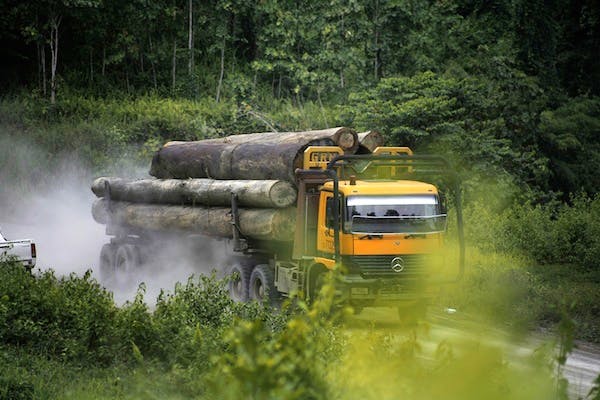Just because the environmentalists have been proved so epically wrong about global warming doesn’t mean they’re right about everything else. Ocean acidification, overpopulation, species loss… you’re going to hear a lot about dire and urgent threats like these in the coming months as the greenies establish a fallback position after the collapse of their climate change scam. But it’s the same old toxic mix of misanthropy, religious dogma, control freakery and anti-capitalism, repackaged with different labels.
Let me give you another example. A couple of months ago, you may have noticed the amiable TV presenter Ben Fogle being monstered in the lefty press for environmental crimes he’d apparently committed on a trip to Sarawak (the Malaysian side of Borneo).
Had he eaten a baby orang-utan? No. Had he pulled the wings off a particularly lovely tropical butterfly? Well, you’d think so from the newspaper’s hectoring tone. But no, what he’d done wrong, apparently, was to give publicity to one of the most wicked, corrupt, environmentally destructive regimes on the whole planet. Sarawak, claimed the article, is ‘controversial’ because ‘vast amounts of industrial logging have left only 5 per cent of forests that have not been either logged or converted to palm oil plantations’.
Well, not being a Malaysian politics expert, I concede it’s theoretically possible that Sarawak really is the new North Korea. But two things about these claims set my alarm bells ringing. The first was the personal nature of attack on Fogle — a classic Alinskyite technique much used by lefties and greenies to make up for their lack of decent arguments. And the second was that weasel boo-phrase ‘industrial logging’.
Never mind the fact that, as Greenpeace’s co-founder Patrick Moore has long argued, silviculture is one of the world’s most eco-friendly, renewable and sustainable industries. As far as the greenies are concerned, the only good forest is a virgin, pristine forest preserved in perpetuity from the depradations of evil man.
Well, fine. You can see why this primeval fantasy might make powerful emotional sense, especially if you’d had a few spliffs with your hot-chick new Peta girlfriend after watching that magical shiny tree thing on the DVD of Avatar. But in the history of human progress it merits barely a second’s serious consideration. If we hadn’t cut down the forests which once covered northern Europe there would have been no western civilisation. So in what way is it acceptable for us to say to still-forested places like Sarawak: ‘Sorry guys, we’ve had our progress but you can’t have yours’?
There’s a lot of this closet racism in the environmental movement. Dig beneath all that professed concern about trade justice and the plight of the developing world and what you’ll find is a pathological fear of brown and yellow people a) breeding too much and b) acquiring a taste for the kind of lifestyle we take for granted in the West.
‘Imagine how bad pollution will get if all the Chinese have cars!’ they shudder. ‘Think of all the scarce resources we’ll deplete once every African expects running water and electricity!’ And it’s not just the deep-green activists who think this way. I’ve heard it from many otherwise sound, down-the-line conservatives. ‘Well, of course, the elephant in the room…’ they begin, tapping the side of their nose. And you know where they’re going. Always but always it’s ‘overpopulation’.
So when the greenies have a go at a place like Sarawak they’re pushing at an open door. Their criticisms chime so perfectly with an instinctive feeling so many of us have: that really the job of remote jungle states is to preserve themselves in aspic, the better that we may gawp on our bespoke eco-holidays at natives properly dressed in their penis gourds and their feathered headdresses.
Don’t get me wrong. If ever I go to Sarawak, that’s just the sort of Ray Mears stuff I’d like to see too. And the very last thing I’d want is for all that rainforest to be chopped down and all the people and hornbills and orang-utans rendered homeless. But is this what is happening?
If you believe some of the claims in the Economist and the Independent — like the shocker that Sarawak has lost ‘more than 90 per cent of its primary forest’ to logging — you’d imagine the place had no trees left. But this is a statistical sleight of hand typical of the green propaganda machine: ‘primary’ means untouched by human hand — so it’s hardly surprising that so little of Sarawak, where forest dwellers have felled trees for many centuries, qualifies.
As to the rest, yes, I gather it’s true that Sarawak’s democratically elected government has embarked on a long-term deforestation programme. Not, I suspect, because it’s evil and hates orang-utans and trees, but because it doesn’t want to stay stuck in the stone age and neither do its voters. Some of the forest will be permanently cleared for agriculture and industrial development; some will be managed, cut and replanted cyclically, for the timber industry; some will be designated a Totally Protected Area and left untouched.
But here’s what you’d never gather from all that greenie scare-mongering: when the plan is finished in 2020, fully 70 per cent of Sarawak’s landmass will remain covered in forest. If it were a country, as opposed to a Malaysian state, this would put it among the world’s top 15 most forested countries — and, of those, the second most populous.
Does this sound to you like a country with a serious environmental problem? I’d say, before we start casting stones, we ought to look at the problems on our own doorstep. There’s a beautiful, unspoilt place I know called mid-Wales, for example, which they’re planning to destroy with these enormous pylons to carry the intermittent energy produced by ugly, bird-and-bat-killing wind turbines….
Got something to add? Join the discussion and comment below.
Get 10 issues for just $10
Subscribe to The Spectator Australia today for the next 10 magazine issues, plus full online access, for just $10.















Comments
Don't miss out
Join the conversation with other Spectator Australia readers. Subscribe to leave a comment.
SUBSCRIBEAlready a subscriber? Log in